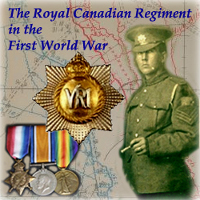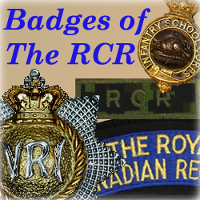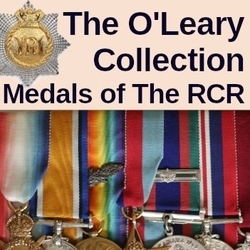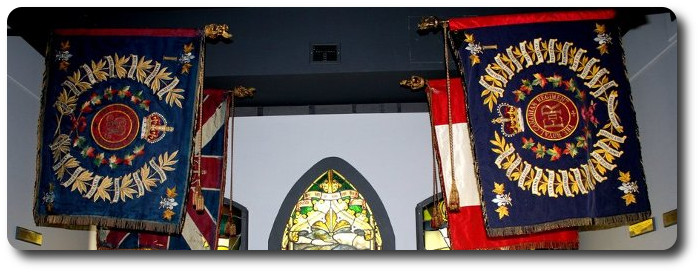
Researching The Royal Canadian Regiment
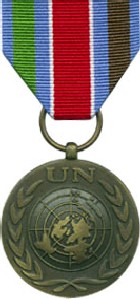
UNPROFOR was established in February 1992 as an interim arrangement to create the conditions of peace and security required for the negotiation of an overall settlement of the Yugoslavian crisis. The UN Protection Force (Yugoslavia) (UNPROFOR) Medal was awarded for 90 days consecutive service from 01 March 1992 to 19 December 1995.
2RCR in UNPROFOR
Pro Patria, Issue No. 74, April 1993
As has been the case for the last couple of years, the bi-annual Pro Patria submission finds 2 RCR at an extremely busy time. Here we are now at the end of our move to Visoko, Bosnia and settling into our area of operations.
The immediate post-Christmas season found the 2 RCR Battle Group still waiting anew mission and tasking. Although the days were constantly warm and beautiful, they had begun to drag by with the Serbian authorities continuing refusal to allow us to pursue our original mission in the north Bosnian area. Training became the mainstay of our daylight hours. The Training Cell had brought along a few QL4 course packages with the thought that they may be of some assistance. They proved invaluable in allowing our various companies to conduct not only refresher training, but to also run complete courses.
Meanwhile, our Assault Pioneer Platoon busied themselves with endless land clearance tasks. This presented our troops with unique training opportunities as we constantly found various unexploded ordnance and a wide array of land mines, all of which required immediate destruction or removal. Likewise, our engineers, 2 Troop 5RGC kept busy with construction tasks in the area of Camp Polom, home to the Canadian Contingent Support Group.
Local security and protective measures along with contingency planning became the focal point of our activities during the latter part of January and early February when tensions between Croats and Serbs rose. With three of our five camps located on the boundary between Croatian areas and the Serbian controlled Kyrinja, we would have found ourselves in the middle of any conflict in that region. Luckily though Sector West UNPA remained calm. As the news media were quick to point out, this stability in our area at a time when other sectors saw violence was due in a large part to the well armed Canadian battalions located there. So although our three months in Lipik were frustrating for the ordinary soldier, perhaps it was not in vain.
Throughout January we had heard rumours of a possible move to the Sarajevo area. Many of us of course, after months of waiting, viewed it all with a jaundiced eye. And of course, we were proved dead wrong.
In mid-February the rumours grew stronger but the "doubting-Thomas" prevailed. Then suddenly on 16 February word came that national approval had been obtained and we would be moving to an Area of Responsibility (AOR) northwest of Sarajevo as soon as possible. This was the beginning of the most interesting troop move in recent regimental history.
Although word came in the midst of a two-week UN leave block and at the beginning of 60 hour pass (that is with 25% of our personnel away) we had not to worry. Careful planning at the sub-unit level had put us ready at 48 hours notice to move. But as with many well laid plans, things quickly went somewhat astray. The painful truth regarding overly optimistic estimates of ferry size, trainloads and railhead capacity rapidly altered our smooth 48 hours of move countdown to the ever so simplistic, "get your kit on the train now".
The four phase movement began with the camp tear down and short road move from Lipik to the railhead in Daruvar .This was done in three main groups: advance party, main body and trail party , spread from 18 February until 3 March. At the railhead, vehicles and sea containers were loaded onto flat cars and troops corralled into passenger cars for the 15 hours journey. We passed the night portion of the rail journey in much needed sleep. Most awoke to the beautiful scenery of deep valleys and mountain villages as the train continued its way towards the port city of Rijeka, Croatia. For a good number of our troops, it was their first train ride. It could not have happened through more splendid terrain.
In various groups, the Croatian rail system dropped us off at the Adriatic port in Rijeka. There we lived from one to four days awaiting our scheduled ferry lift south. Even though we lived on train cars at the port/railhead we were comfortable, well fed and able to catch up on lost sleep.
As ferries arrived, our movements personnel guided the careful loading of vehicles so that in the end each ferry resembled the proverbial sardine can. The ferry ride of 17 hours southward gave all aboard a wonderful tour of the Dalmatian coast - a pleasure for which as tourists we would have paid dearly. After unloading in the port of Ploce we quickly marshalled our vehicles for the long drive inland.
Convoys were led by a liaison officer who was familiar with the route. Armoured vehicles, either M113s or cougars were evenly spaced throughout the wheeled packets for protection. As the vehicles crept inland, a certain anxiety grew within each of us and questions as to the exact nature of our mission were answered. Mixed with the breathtaking backdrop of deep ravines and snow covered mountain tops, were scenes of enclave destruction and ethnic terror.
After several hours the convoys' route made abruptly changed. Gently curving pavement became an ice-covered single lane road weaving back and forth up and down a mountainside. What is now part of our AOR, the Tarsin-Kresevo road was immediately an intense point of individual concern, as many vehicles slid dangerously close to the road edge and certain destruction. (It was especially intense if your personnel kit happened to be in the particular vehicle at risk!). Some took a full 24 hours to complete the crossing.
The final section of the move was a deceivingly simple 60-minute road move. Although a good road, the portion near the town in which we are garrisoned is covered by occasional Serbian mortar and sniper fire. Because movement through this part is forbidden at night for soft skinned vehicles, convoys arriving after dark were forced to leaguer in another town until morning.
Eventually, after a long two weeks, the entire Battle Group was complete in Bosnia. We quickly established ourselves in better accommodations than those in Lipik. The majority of the battalion lives in an industrial complex adjacent to the town of Visoki. Two uncompleted factory complexes here make for dry , albeit dusty, concrete hard stands on which we have erected our tentage. This forms Caserne Cavalier. Only two companies, K Company (Combat Support) and B Comapny, 1 RCR live apart from the main body.
They have established Camp Paardeberg (erected on 27 February 1993) on the site of a disused brick factory in Kiseljak. Both camps are well sited and provide good protection. Both are roughly 25 km west of Sarajevo and close enough to the current lines of confrontation that small arms and mortar fire are heard almost nightly. (A couple of close ones have even sent us running for our hardened basement shelters.)
With our three months of waiting behind us, all the troops are anxious to leap into the operational waters with both feet. We begin with our most risky task. Mortar platoon rises early every morning to run the Sarajevo gauntlet. They marry up with a UNCHR convoy carrying an average 100 metric tons of aid and escort it through various checkpoints into UNCHR warehouses in Sarajevo. Although not a simple job, in fact quite dangerous given the regular mortar and sniper activity levels of Sarajevo, the task has been proceeding very well. Indeed, as of 17 March the task was increased to two convoys a day.
Anti-armour platoon may not be exposed to the same dangerous conditions as mortar platoon, but they are undoubtedly more frustrated. Their task is essentially traffic control and route clearance on the only road into the area, including Sarajevo. The complicating factor is that the route is a single lane, two direction mountain road and the main route used by the majority of aid convoys. The arrival of Spring has turned it into a trail of mud. Tire chains are essential but are not always enough. The only thing keeping the route open are the M113s of anti armour platoon. Although each day must be seem longer and more frustrating than the previous, it is an essential job. These troops ensure that the desperately needed aid convoys make it through the region for the delivery into Sarajevo and other areas where people are suffering.
Pioneer platoon has been just as busy. Although defensive and accommodation construction tasks have absorbed their time they do escort the weekly convoy into the Muslim enclave of Gorazde. It's not as simple as it sounds. The escort portion, basically a rifle platoon with recovery and medical assets. strikes out from our area across front lines, through Sarajevo and out into the Serbian dominated regions of Bosnia. In the middle, the troops meet up at a check point with the UNCHR convoy coming into Bosnia from Belgrade. From there they escort the relief column into the targeted enclave. Other similar convoys into the eastern enclaves have been escorted by B Coy, and as well by our armoured muscle, A Squadron, 12 RBC.
When successful the troops find these tasks to be very rewarding . They return knowing they have completed their mission, that of bringing food to hungry people. Lately however, Serbian check points have been delaying the aid delivery by placing unwarranted and unacceptable inspection demands on the escort vehicles. Then our soldiers must wait at times up to several days by the side of the road until authority is obtained to move. If a convoy must be turned around, then all find it frustrating.
Additionally, both G and B companies have been making forays into downtown Sarajevo. Infrastructure repair teams (civilian workers repairing utilities for the besieged city) are escorted in APCs to the repair site, usually right at the front lines and are watched over while they work. Should the team come under fire, the APCs provide a hardened shelter.
A Squadron, with their wheeled cougars, have provided 2 RCR with its flexibility. Apart from YIP escorts and several runs into Sarajevo, they escort the daily UNCHR Dutch and Danish convoys as they pass by the front lines on their way to and from Tuzia. As well, they provide overwatch security for the civilian workers loading coal at a nearby mine which sits between Serb and Bosnian defensive positions.
For their part, H Company is nearly complete after their redeployment from Macedonia. Only a delay in the air transport of their APCs has prevented their complete operational employment. In Macedonia, they had made history by being the first UN Force deployed as a preventive measure, hopefully precluding the out break of hostilities. Until recently replaced by a composite Scandinavian battalion, they had spent two months along with Recce platoon patrolling approximately 250 km of Macedonian border regions.
Because H Coy has had their "good go" already (the Colonel's words) the history makers have been relegated to the more humble yet still vital task of camp security (with already two drive by shooting incidents at our camps, this task demands a good number of personnel resources). Additionally, they will be given their share of repair team escorts into Sarajevo.
In short then, 2 RCR is at long last doing exactly what is had come to do and then some. All troops are continually busy and this of course helps pass the time quickly. Given the local situation we are taking all precautions possible to ensure everyone's safe return to Canada. Despite this, as was widely reported in the Canadian press, we have sustained three casualties, one of them, tragically, fatal. On 24 March two soldiers from B Company, MCpl Paris and Pte Parrell were wounded by shrapnel from Serbian fire while engaged in relief activities in eastern Bosnia. Fortunately both are expected to fully recover. The next day, 25 March, MCpl John Ternapolski (Jr) of Anti-Armour platoon was killed in a Ml13 accident. He was buried in Pembroke Ontario on 1 April. He will be sorely missed.
As we conclude this report the 2 RCR Battle Group still has six weeks in Theatre. We will provide an additional update for you in August's Pro Patria.
To all Royal Canadians, we send our greetings and best regards and our hopes for an enjoyable summer. We hope to see many of you upon return to Canada.
